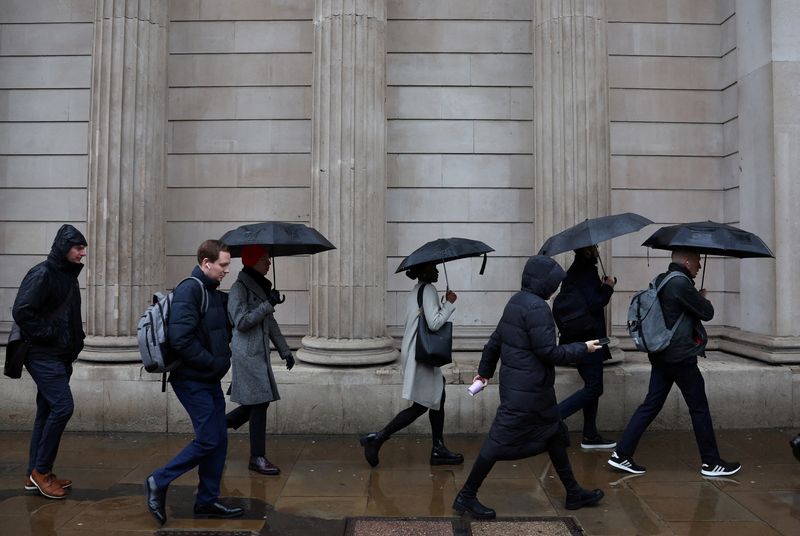By William Schomberg
LONDON (Reuters) – Britain’s next prime minister, Keir Starmer, accused Rishi Sunak’s Conservatives of “fourteen years of economic failure” during the election campaign, but he has no clear quick fix to get the country out of its slow growth rut .
Living standards have stagnated since the Conservatives came to power in 2010 and Britain’s recovery from the COVID pandemic is the weakest among major rich countries after Germany.
Starmer will be under pressure to use Labour’s large majority in parliament to end the sense of decline, from creaking public services and inflation-hit personal finances to housing shortages and weak business investment .
But with the national debt approaching 100% of gross domestic product and taxes at their highest since just after the Second World War, Starmer insists the turnaround will take time.
“We will have to do very difficult things to move the country forward,” he told voters just days before the election. “There is no magic wand.”
Unlike 1997, when Labor under Tony Blair ousted the Conservatives as the economy grew by almost 5% that year, Starmer may struggle to get UK annual growth above 2% in the near future, in line with a largely slow Europe.
The British economy is expected to grow by less than 1% this year.
The 2007-2008 global financial crisis, which hit Britain particularly hard, cuts in many areas of government spending and the shocks of Brexit, COVID and rising energy prices have combined to put pressure on the sixth largest economy in the world.
But Starmer and his likely pick for Chancellor of the Exchequer Rachel Reeves say they will not turn to borrowing to finance a growth boost while memories of the bond market in 2022 under former Conservative Prime Minister Liz Truss are still fresh.
They have also promised no major tax increases, leaving the new government little room in the budget.
“The fiscal legacy will be difficult and there are many challenges that need to be addressed,” said Lizzy Galbraith, a political economist at investment firm Abrdn.
Unlike 1997, when Labor stunned financial markets by handing over operational independence to the Bank of England, its first economic policy move is likely to be modest.
It plans to take swift action to reform Britain’s archaic planning system to accelerate investment in housing and infrastructure, as part of a plan to improve the country’s weak productivity, support growth and more generate tax revenues to invest in healthcare and other stressed public services.
The Conservatives refused to upset core supporters in suburban areas, where much of the housing growth is likely to occur.
Starmer promises to be stubborn when it comes to breaking down the barriers to growth, but the challenge will be great.
“We have been here before with a new government promising planning reforms, but this is being watered down in office,” says Abrdn’s Galbraith.
Jack Paris, CEO of InfraRed, an international infrastructure manager, expects Labor will focus more on private investment in green energy and accelerate transport projects.
“The new UK government should provide greater clarity and visibility to investors with a long-term infrastructure strategy that will be a catalyst in making Britain one of the most attractive destinations for long-term investors again,” he said.
FAILURE-BRITAIN
Also on Starmer’s to-do list is reversing the post-pandemic rise in the number of people leaving the labor market due to illness, something other wealthy economies have already done.
The Boston Consulting Group and the NHS Confederation, which represent much of the healthcare industry, estimate that getting three-quarters of early school leavers since 2020 back into the labor market would increase tax revenues by a total of as much as £57 billion over the next five years can increase. .
For context, Britain spends around £11 billion a year running its justice system.
Starmer’s growth plan also includes lowering some trade barriers with the European Union. But he has ruled out a major overhaul of Britain’s Brexit deal.
Economists say Labor’s policies so far are unlikely to make a big difference, let alone meet Starmer’s goal of making Britain the leader of the Group of Seven for sustainable economic growth, something the country has hardly succeeded in doing since the Second World War.
Higher public investment would be positive for growth, but Labour’s promises to reduce immigration could have the opposite effect.
Analysts at Goldman Sachs say Labour’s reforms will boost Britain’s economic growth by just 0.1 percentage points per year in 2025 and 2026.
Economists polled by Reuters last month expected the economy to grow 1.2% in 2025 and 1.4% in 2026, less than half the pace in the decade before 2007.
But in some ways Labor is inheriting an economy that is in decline, a point Sunak tried in vain to sell to voters.
After a recession in 2023, there is talk of a recovery and high inflation has now decreased, meaning the Bank of England may start cutting interest rates as early as next month. Business and consumer confidence are increasing.
Starmer says – and many business leaders agree – that political stability will help attract investment to Britain after a turbulent eight years in which the country was ruled by five different Conservative prime ministers.

Investors are already aware of Britain’s lower risk profile in light of rising populism in France and the United States.
Laura Foll, portfolio manager at Janus Henderson Investors, linked recent outperformance of UK shares to this shift in perception. “Relatively speaking, Britain is looking much better from a political point of view,” she said.


